by Mary Rupert
James Moore, a Kansas City, Kan., resident, told a story at tonight’s Mayor’s Clergy Roundtable forum about how he once saw a couple of teens with nothing to do and asked them to help him with work one day.
They did, and he asked them why they didn’t have a regular job. They told him they were having problems with the law, and that’s why they couldn’t get a job, said Moore, who is president of the Wyandotte Community Coalition Foundation, which works with kids in the community and awards scholarships.
“I said, ‘Don’t let people define who you are. You define who you are,’” Moore said. Along with the advice, he gave the two youth $200 and told them to buy a lawn mower and knock on doors to cut lawns. About a year later, they had their own lawn mowing service, had a pickup truck, a trailer, a rider and push mower, and it all started with the $200 and the idea, Moore said.
“Our motto is saving kids one block at a time,” he said. Every church should reach out to the kids in their area, find something for them to do, and have lunch with them, he said.
“We can make a difference,” Moore said to applause.
Unemployment, hunger and a low level of education of some residents are some of the factors that might be leading to crime and violence in the community, community participants said at a forum tonight.
How the community can reduce violence was the main question addressed at tonight’s Mayor’s Clergy Roundtable forum held at the Kansas City Kansas Community College Technical Education Center, 6565 State Ave., Kansas City, Kan. Some residents said they thought the community should address unemployment and hunger in order to reduce crime.
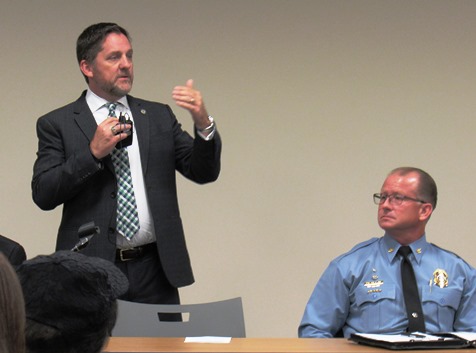
Residents also gave ideas on changes they would like to see in the Police Department, and there were compliments for the Police Department, as well.
More than 100 people turned out for the event. The moderators of the event were the Rev. Jimmie Banks and Monsignor Stuart Swetland.
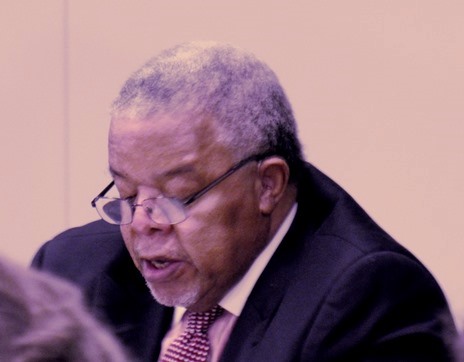
“This community belongs to us, and we should not expect anybody from the outside to come here and fashion a process that will get us where we’re going better than we,” Banks said.
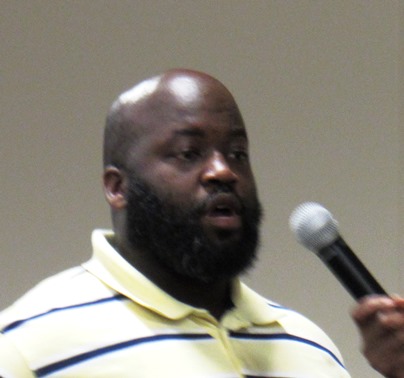
Kendon McClaine said the last few homicides were solved very quickly, with some cooperation in going door-to-door in the community. He said better involvement was needed from the churches in these efforts.
Brendan Jackson said more communication is needed between the police and teens, maybe with more activities. “We’re more scared than we are against you,” he said. “We’d like to work to communicate with you.”
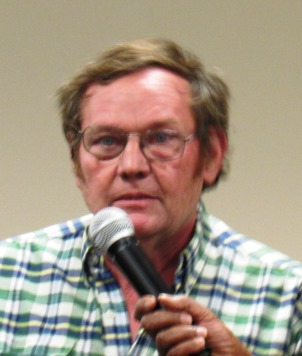
Jerry Vest said, “We have great police officers, and they’re also upset with the revolving door that we have.” A few hours after some persons are arrested, they’re back on the streets again, he said.
Sherrie Jones said the youth are the future of the community, and she agreed there needs to be more activities with law enforcement and teens. If police have better communication with teens, then they’re able to trust and befriend them, and a lot of crimes might be solved, she said.
“If we can take a small step of getting to know someone who’s different from us,” another resident said, “I think can go a long way toward helping us have a perspective that someone else might have.”
Annie Boyd said she loves the police, but the police have to be held accountable. People should not be judged on their looks or hair, she said.
“One thing to help us is to treat everyone with respect, not just some,” she said. “We’ve got to a place where we’re scared to call the police if we’re black. …Train the police how to shoot so as not to kill,” she said.
Another resident said people need to work to change their beliefs about one another, and first start changing their perception about one another. He was in favor of holding more events with police and residents.
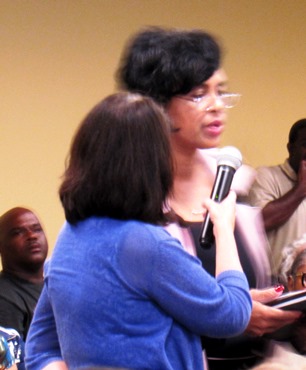
Karen Jones said, “We have to recognize there is responsibility on both ends.”
“We need to pool our resources,” she said, and not go individual ways. She said a police youth program already in place should be used and expanded on.
“If we don’t take responsibility first in our own households, or in our extended families, it’s not going to be too much that the Police Department is going to be able to do,” she said. “All of you probably know, because we’ve listened to the news, a presidential candidate recently posed the infamous question, ‘What do you have to lose?’ Well, if a lot of us are saying we have nothing to lose, guess what? There is major trouble up ahead, and that presidential candidate doesn’t even have to worry, because if you have nothing to lose, you’re not even going to vote.”
She suggested looking at the police OK program for youth, and said they should try to reach other persons in the community.
Another resident said there was a lot of anger in the country. “I think it’s going to take a heart change in the police force and in the community,” he said. “We need to have a heart change in the community as well as the Police Department, and then we can be civilized, and we can live together.”
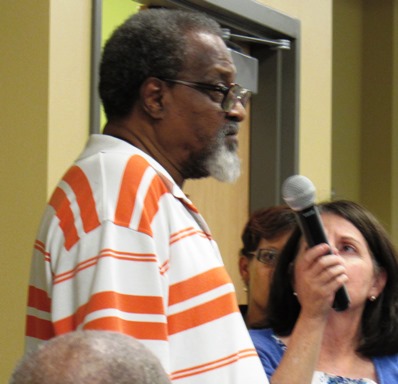
Richard Mabion, president of the Kansas City, Kan., NAACP, said he didn’t believe there is any program that any one can create that can make a difference out there on the street.
“What we’re dealing with out there is a demonic spirit,” Mabion said, “and the only way you deal with a demonic spirit is through spiritual warfare.”
He said the community’s problem is a lack of employment, and Wyandotte County had 21.4 percent black male unemployment in 2014.
“We need to figure out how to get our people employed,” Mabion said.
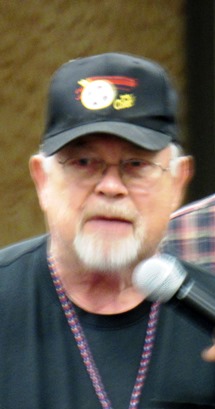
Ross Wornell, the manager of the food pantry at St. Paul’s Episcopal Church at 18th and Washington, suggested that the police officers attend breakfast at the food pantry there, or at other food pantries, and serve. “The hardest position to fight with one another is down on your knees with an apron tied around your waist,” he said.
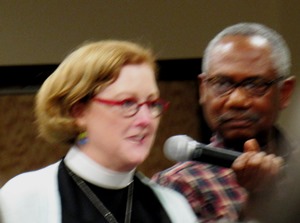
The Rev. Dixie Junk, priest in charge of St. Paul’s, offered an invitation to the community to attend breakfast at St. Paul’s at 9:30 a.m. Saturdays. She invited the community and police officers to have conversations while they are there having breakfast.
Amber Adams, health educator, said she works with teens, and it is important to remember that they live for now. A lot of them feel they don’t have trusted adults to deal with, she said. She asked officers to listen to the teens. She described a case where officers did not believe a teen was a victim. If they don’t believe teens, the teens will not talk to the officers, she said, and may take matters into their own hands.
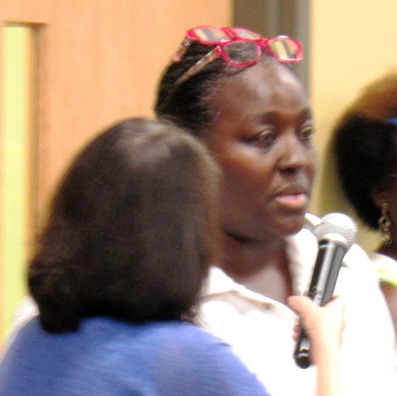
Janice Witt, director of the Reola Grant Center, which has a food pantry, said almost all of the students in Wyandotte County qualify for free and reduced lunches. Some may not have food at home in the evenings, she said. Malnutrition affects behavior, she said. Mental decay, obesity, anger, violence, and disobedience occurs during malnutrition, she said. “Our community is a state of malnutrition,” she said.
She invited anyone who was in need of food to visit the Reola Grant Center. “What happens in the city is the problem of everyone in it,” she said.
Tamara Strickland, who works with a maternity shelter, said the focus should be on education. Many of the persons she sees as part of her work have little education, she said. “”If we’re hungry or thirsty or don’t have a place to live, we’ll do anything to get it,” she said.
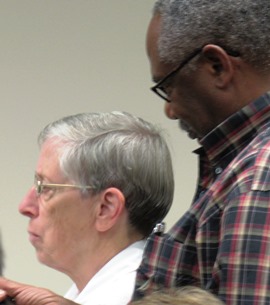
Sister Therese Bangert said she wanted to compliment police officers on how they handled the standoff a few weeks ago on Parallel Parkway. Power doesn’t always mean winning, she said. Sometimes power backs down and keeps their power. Everyone needs to work on deescalating rhetoric and what is being said, she added.
Another resident said Kansas City, Kan., police officers should return to the schools. A few years ago, the school district formed its own police force. He favored KCK officers returning to the schools, and said the first line of defense is community policing.
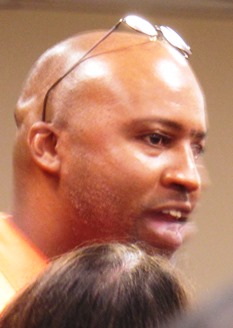
Louis Monroe, who has worked as youth director at Stranger’s Rest Baptist Church, thanked police officers and asked them to keep up the community policing. He said the police here are ahead of the national situation.
“By everybody being here, I think we’re all on the same page, that we can work together,” he said.
“Please don’t judge your police department by what’s happening nationally,” said Police Chief Terry Zeigler. “We’re accountable to you.”
He said if something happens in the community they don’t understand, residents should call the Police Department and someone could come out and speak to groups about it.
Zeigler also said he was open to hearing what the community thought about how the Police Department is doing and their ideas on how it could be better.
He invited those attending the event to go through the Citizens Police Academy so they can understand why police officers do the things they do.
He also gave out a list of police community outreach initiatives, and asked those attending to look at the list, and see if they could get involved with some of the programs.
Mayor Mark Holland said he convened the Mayor’s Clergy Roundtable by contacting every pastor for which he had contact information. There was already a forum scheduled when Kansas City, Kan., lost Detective Brad Lancaster and Capt. Robert “Dave” Melton in the line of duty, he said.
He said there will be future meetings with small groups of eight to 12 people, along with a representative of the Police Department, to discuss issues more in depth. Some meetings are planned in the future.
For more information and more details on the forum, a video from this forum can be seen at www.facebook.com/MayorMarkHolland/.
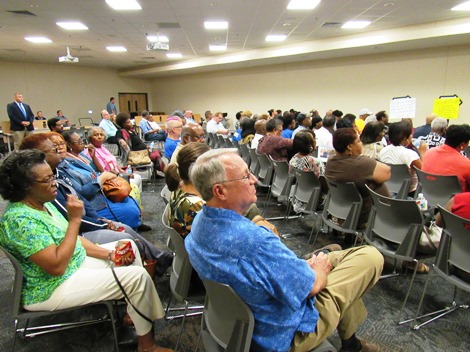
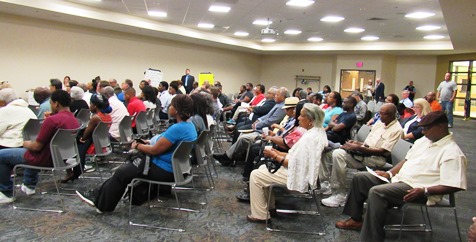

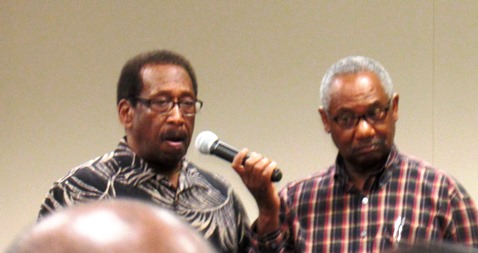
Good reporting and photos Mary. I couldn’t make it to ther event and I appreciate the coverage.